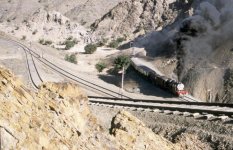Correct. A truck has spring applied brakes that release with air pressure. When you run out of air, you stop.
A train has air applied/released brakes. When you run out of air, you don't stop.
Aaron Z
At the risk of understating the obvious, I don't consider the train design to be Fail Safe.
When I consider what is imposed on trucking, and that I can't put the lightest car made on the road w/o a secondary redundant driver actuated E brake system, I think I'm being fair when saying that Rail gets away with things no other transport sector can.
With an engineer in the cab, yes, I get that a train can dissipate energy w/o working brakes - but you can make the same argument with a car. Still, you wouldn't get past a Safety Check on a car here, w/o a working Ebrake.
With people mostly buying automatics here, it doesn't get used that way much, but one of the design goals for Ebrakes on cars/light trucks is to secure it quickly when Parked. I find it troubling that the lightest vehicles in common use are mandated to have this requirement in place, but not the heaviest high speed machinery in use - Rail.
Yeah.... I get that it's all about Cost Containment/Reduction...... I'm not particularily a fan of lawyers in general, but I hope that some
major lawsuits are won against the rail co's, for negligence. The government seems to be doing about as much disciplining of the rail co's as the parents were of the "affluenza" idiot that was recently in the news.
Rgds, D.
